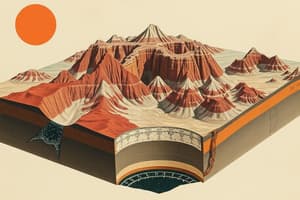Podcast
Questions and Answers
What occurs when ocean plates collide with continental plates?
What occurs when ocean plates collide with continental plates?
- Formation of volcanoes
- Subduction of both plates
- Earthquake generation
- Creation of mountain ranges (correct)
Which landform is created when tectonic plates separate?
Which landform is created when tectonic plates separate?
- Valley
- Mountain range
- Volcanic island
- Mid-ocean ridge (correct)
What is the primary process that breaks down rock into smaller pieces?
What is the primary process that breaks down rock into smaller pieces?
- Erosion
- Sedimentation
- Glaciation
- Weathering (correct)
How does glacial erosion mainly affect the landscape?
How does glacial erosion mainly affect the landscape?
What natural process involves the movement of sediment from one location to another?
What natural process involves the movement of sediment from one location to another?
What geological feature is the San Andreas Fault associated with?
What geological feature is the San Andreas Fault associated with?
Which of the following is NOT a way weathering can occur?
Which of the following is NOT a way weathering can occur?
What causes powerful winds to affect the landscape by moving sediment?
What causes powerful winds to affect the landscape by moving sediment?
Flashcards
Weathering
Weathering
The process of breaking down rocks into smaller pieces.
Erosion
Erosion
The movement of sediment from one place to another.
Wind Erosion
Wind Erosion
The type of erosion caused by wind.
Glacial Erosion
Glacial Erosion
Signup and view all the flashcards
Mountain Building
Mountain Building
Signup and view all the flashcards
Andes Mountains
Andes Mountains
Signup and view all the flashcards
Himalayas
Himalayas
Signup and view all the flashcards
Plates Separate
Plates Separate
Signup and view all the flashcards
Study Notes
Plate Movement and Landforms
- Ocean plates and continental plates can collide, forcing the ocean plate beneath the continental one, causing mountain ranges like the Andes.
- Continental plate collisions also create mountains, such as the Himalayas, as plates push together.
- Plates separate, creating gaps that allow magma (liquid rock) to rise to the surface, forming mid-ocean ridges (underwater mountains), like the Mid-Atlantic Ridge.
- Iceland is an example of a volcanic island formed when the separation of plates creates volcanic activity.
- Plates slide past each other, causing earthquakes, like the San Andreas Fault in California.
- The Ring of Fire is a region with frequent earthquakes and volcanoes, caused by the movement of the Pacific plate.
Processes Shaping Landforms
- Weathering: The process of breaking down rocks into smaller pieces by physical and chemical forces.
- Factors like temperature changes, water, ice, and plant roots can cause weathering.
- The result of weathering are sediments.
- Erosion: The movement of sediments from one location to another by wind, water or ice.
- Powerful winds carry sediment, creating sand dunes.
- Water erodes rock and carries sediments downstream
- Glaciers, large sheets of ice, also cause massive erosion.
- These processes are constantly shaping and changing Earth's landforms.
Studying That Suits You
Use AI to generate personalized quizzes and flashcards to suit your learning preferences.




